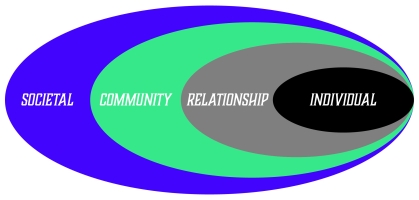Socio-Ecological Model
Socio-Ecological Model
In order to prevent violence across our campus and community, it is important to view the factors from a multi-level perspective. The Center for Disease Control (CDC) uses the Social-Ecological model to understand the factors that influence violence. This model focuses prevention strategies on four levels of the social-ecological environment: the individual, their relationships, the community, and society as a whole.
Utilizing this model, VPVA focuses on both risk factors (those factors that increase the likelihood for an individual to commit violence) and protective factors (factors that support a person and decrease risk of committing violence) associated with preventing perpetration at each level. This also allows for us to develop preventing programming that best fits our student population.

Individual
This first level identifies the biological and personal history factor that could potentially increase the likelihood of becoming a victim or perpetrator of violence, such as:
- Age
- Education
- Income
- Substance use or History of abuse
Relationship
The second level examines close relationships that may increase the risk of experiencing violence as a victim or perpetrator. Some relationships that influence our behavior are:
- Closest friends
- Partners
- Family members
Community
The third level explores the settings in which social relationships occur. Settings are any environment people. Here we identify the characteristics of these settings and how they can be associated with becoming victims or perpetrators of violence. Some examples of our community are:
- Campus or School affiliation
- Neighborhood
- Organization or Club (ex. Greek Org / Athletics Team / Student Club)
- Place of Worship
Societal
The fourth level looks at the general societal factors that help create a climate in which violence is encouraged or inhibited and help to maintain economic or social inequalities between groups in society. Societal factors include things such as:
- Policies and Laws (ex. Title IX Policy / Campus Housing Policy / Student Code of Conduct)
- Cultural norms
Need Help?
Call 856-225-2326 to speak with someone immediately.
Follow Us